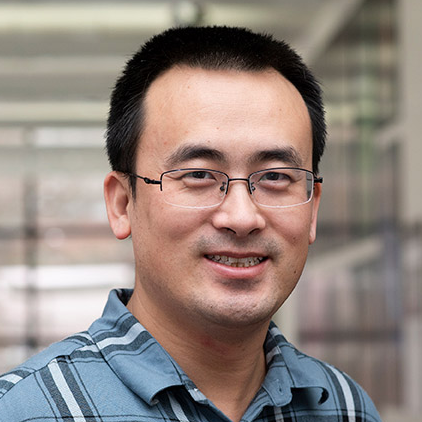PRG Seminar Series
with
Maryland Robotics Center
on
Robotics and Computer Vision
3D Perception under Multi-Sensing Modalities Based on Mobile Platforms
Robotics and Computer Vision
3D Perception under Multi-Sensing Modalities Based on Mobile Platforms
Friday, October 14, 2022
Time: 11:00 AM
Room IRB 4105
and via Zoom
by

|
|
|---|
ABSTRACT
Compared with normal images, high-resolution LiDARs are precise in depth estimation, but usually too expensive. Though single beam LIDAR enjoys the benefits of low cost, one beam depth sensing is not usually sufficient to perceive the surrounding environment in many scenarios. I will present a framework to replicate similar performance as costly LiDARs with the designated self-supervised network and a low-cost single-beam LIDAR. We will demonstrate the 3D mapping performance for both city scenes and crop scenes under UAV. For plant below-ground parts, we proposed an unsupervised learning scheme to build 3D root structure models based on mobile phone images. In order to reconstruct plant roots non-destructively, we developed a deep convolution neural network-based GPR curve signal detection network to detect root GPR signal, followed by a graph neural network-based root shape reconstruction network to recover the root branches' geometry. To overcome the deficiency that RGB images are not suitable for dark and night environments with limited lighting resources, I will also briefly introduce our research on 3D thermal perception can still observe the scene in the low lighting condition.
ABOUT THE SPEAKER
Dr. Guoyu Lu is an Assistant Professor at the Department of Electrical and Computer Engineering, University of Georgia. He previously was an assistant professor at the Chester F. Carlson Center for Imaging Science of Rochester Institute of Technology (RIT). Prior to joining RIT, he was a research scientist on autonomous driving at Ford Research and computer vision engineer at Disney ESPN Advanced Technology Group. Dr. Lu finished his PhD Computer Science at the University of Delaware and MS degrees from University of Trento and RWTH Aachen University. He was a visiting scholar at the Auckland University of Technology. He has been awarded US Department of Agriculture (USDA) New Investigator grant, NSF CRII Award, Ford URP Award, Tencent Rhino-Bird Young Faculty, Frank A. Pehrson Award, and Erasmus Mundus Scholarship. He is serving as the Associate Editor of IST/SPIE Journal of Electronic Imaging, IEEE Robotics and Automation Letters, and ICRA 2023. Dr. Lu has board research interests spreading across computer vision, machine learning, and robotics.